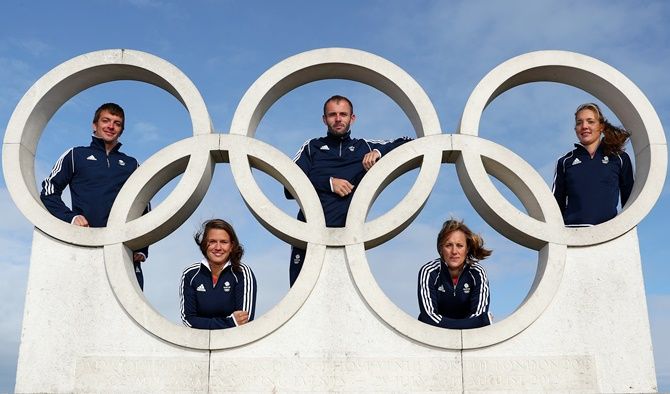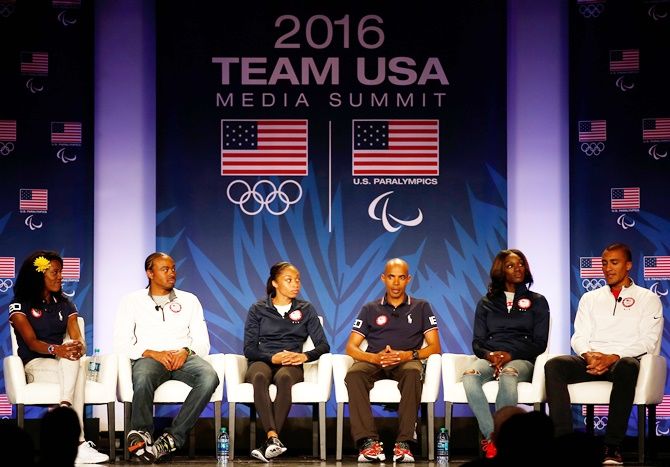
American swimmer Michael Phelps, the most decorated Olympian of all time, said on Tuesday he hopes this year's Rio Olympics can help heal a sports world hit by recent doping and corruption cases.
Phelps, who is hoping to add to his mind-boggling collection of 18 Olympic gold medals at the August 5-21 Rio Games, feels the world's biggest multi-sports event has the potential to help people move on from the recent spate of negative headlines.
"The Olympic movement has always been uplifting. To have so many nations together in one small area competing for Olympic medals, it's an amazing experience," Phelps told Reuters during an interview in Baltimore.
"There's so much excitement around the Olympics that hopefully we can turn some of these negative stories into a positive with what's going to happen this coming summer."
Russian tennis player Maria Sharapova's admission this week that she failed a drug test was the latest dark cloud to hit the world of sport following world soccer body FIFA removing its top leaders in a corruption scandal and allegations of widespread doping in Russian athletics.
"In a perfect world everybody would love to have clean sports all around. That's really all that needs to be said," said Phelps.
"For us, we don't know if we're standing next to someone who is doping or is not doping. The only thing I know at the end of the day is that I can control what I do and who I become and that's all I worry about."
Phelps, who will be 31 during the Rio Games and has committed himself to one last run at Olympic glory after having announced his retirement at the 2012 London Olympics, was appearing at the Under Armour complex to promote his newest TV commercial for the sports apparel company.
Phelps, who said he had failed to give his best effort at the London Games due to sub-par preparation despite winning four gold and two silver medals in 2012, is determined to be at his best in Rio and has special motivation.
The swimmer, who has a record 22 Olympic medals in all, shrugged off concerns about the Zika virus and other health and pollution worries surrounding the Rio Games and said his wife planned to travel to Brazil with their newborn son, expected to be born May, to watch him swim.
"We're not worried with travelling with our newborn," said Phelps.
"That’s something that we’re both looking forward to. Being able to have our son watch the last time I ever compete is something that will be a fun story and a moment that I’ll never forget."
Fear Rio won't be clean

US Olympic athletes expressed little sympathy for tennis star Maria Sharapova's revelation that she failed a drug test, saying they wanted sporting officials to raise the pressure for clean play.
Several athletes also expressed concern about reports that doping remains rampant in Russia and that lax compliance in other countries could mean the Aug. 5-21 Olympic Games in Rio de Janeiro will be plagued by doping.
The steady drip of doping news was a particular source of frustration since US athletes face such a constant barrage of tests that some avoid taking over-the-counter cold medicine.
"I don't even like to take multi-vitamins I'm so nervous," said Kayla Harrison, 25, who won a gold medal in judo at the 2012 London Olympics and hopes to defend her title in Rio.
"There are so many things on that list that you don't even think ... you can't take Benadryl in competition," Harrison said. "It scares the crap out of me because the last thing I want is a bad test to tarnish my chances, ruin my reputation. So for me it is never worth the risk."
Sharapova, 28, said her family doctor had been giving her the drug, mildronate, for a decade before WADA banned it.
But athletes attending a US Olympic Committee event in Beverly Hills, California, had no sympathy for Sharapova's failing to notice the new ban on the drug.
"As an athlete it is your responsibility to always know what's being placed on the banned list. Period," said Aries Merritt, a 30-year-old who won a gold medal in the hurdles in 2012 and is staging a remarkable comeback after undergoing a kidney transplant in September. "There is no excuse."
A German TV documentary this weekend reported that Russian coaches who had previously been suspended for doping were still working in athletics, while others continued to provide banned substances to athletes.
Russia has been banned from international track and field in the wake of a report exposing widespread cheating and corruption but have been scrambling to prove they have cleaned up and should be allowed to compete in Rio.
WADA in November accused Russia's anti-doping agency of conspiring with coaches and officials to cover up the use of banned substances by its athletes. No decision has been made on whether the Russian athletics team can compete in Rio.
Russia's sports minister has dismissed the report, calling ARD's reporting misleading.
The string of doping revelations and allegations left some US athletes wondering if all competition at the Rio Games can be clean.
"I'm not completely confident," said Alysia Montano, who was fifth in the 800 meters at the 2012 Olympics, behind two Russian runners whom anti-doping officials have since said should be sanctioned for using banned substances. "I'm still really wary."
Montano, 29, said she was "flabbergasted" at news this week that Kenya, a running powerhouse whose athletes won 11 medals at the 2012 Games, did not possess a laboratory compliant with WADA standards where its athletes could be tested for use of banned performance-enhancing drugs.
WADA and the International Olympic Committee have warned Kenya that if the country's anti-doping protocols are not in line with international standards by April, the country's athletics team may not be eligible for Rio.
"As a clean athlete it is very frustrating getting on the line and knowing this may not be a fair race," said US sprinter Allyson Felix, a four-time Olympic gold medallist who is aiming for more medals in Rio.
US athletes also grumbled that they would like to see their international counterparts face the same level of discipline they do for doping violations.
"If one of the US Olympic athletes tests positive, then we're going to be banned for a few years," said swimmer Conor Dwyer, a gold medallist at London 2012. "That hasn't been the case with athletes that have failed tests in different countries."
Ryan Lochte, the 11-time Olympic medallist swimmer, said he wasn't going to let the concerns distract him.
"Test me as much as you want," Lochte said. "Just don't do it during swim practice."












 © 2025 Rediff.com -
© 2025 Rediff.com -